SCPNT Historical Videos & Animations

From the late 1980s through the creation of SCPNT in 2007 to the present day, various research videos and animations, as well as publicity videos have been created at Stanford. We have collected and provided access to a number of these videos and animations on this video album page.
Each video / animation is represented below by a Play Video / Play Animation button, accompanied by a short description of the video or animation.
Click any Play Video / Play Animation button to open a web page where you'll find more information and a web player window to view the video / animation.
2014 Arctic Navigation In-Flight Test

Video documenting the in-flight test by the Stanford GPS Lab and Professor Andy Barrows to examine radar produced positions from the ground.
Tyler Reid, Stanford University GPS Lab, December, 2014
Run Time: 3 minutes, 45 seconds
View 2014 Stanford GPS Lab In-Flight Test Video
2014 GPS Lab Arctic Flight Test Route Animation

Arctic Route animation from in-flight test by the Stanford GPS Lab and Professor Andy Barrows to examine radar produced positions from the ground.
Tyler Reid, Stanford University GPS Lab, December, 2014
Run Time: 3 Minutes, 55 Seconds
Play 2014 GPS Lab Flight Test Route Animation
GPS Lab Tunnel in the Sky
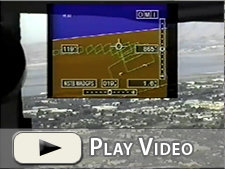
GPS Lab Tunnel in the Sky Video
Video showing integration of three key emerging technologies:
- Differential GPS
- Enbedded 3-D Graphics
- Sunlight-readable displays
Andy Barrows, Professor J. David Powell, Professor Bradford Parkinson, and Professor Per Enge, Stanford University GPS Lab, 1994.
1998 Wide Area Differential GPS Alaska Flight Test

Stanford's Wide Area Differential GPS (WADGPS) Laboratory conducted experimental WAAS Precision Approaches at the Juneau, Alaska International Airport in August of 1998. The testing included flight trials, collection of WAAS precision approach performance data, and capture of production in-flight video footage.
Video 1: Side-by-side simulation and actual cockpit view—Run Time: 36 Seconds
Video 2: Video Recording (including audio) of Automated Runway Approaches with Inset Simulation Window—Run Time: 17 Minutes, 17 Seconds
View Videos from 1998 Alaska Flight Tests of Wide Area Differential GPS Technology
From Einstein to Farming— Stanford's Integrity Beacon and the Formation of Novariant, Inc.
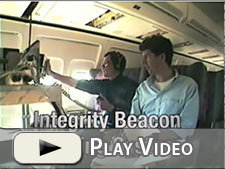
A 4-minute video telling the story of how Clark Cohen and fellow Stanford Aero-Astro graduate students augmented and repurposed the GPS-based spacecraft attitude and position control system they helped develop for the Stanford/NASA Gravity Probe B (GP-B) experiment for use in the automatic landing of aircraft and the automated steering of tractors for precision farming.
1994 • Stanford Integrity Beacon Landing System TV Coverage
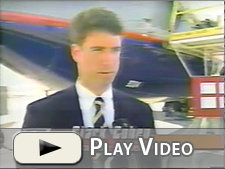
Television coverage from CNN and various San Francisco Bay Area stations of GPS integrity beacon auto-landing tests of a Boeing 737 aircraft
Clark Cohen and fellow graduate students from the Stanford University GPS Lab, 1994
Run Time: 14 Minutes, 7 Seconds
View 1994 Television Coverage of Stanford's Integrity Beacon Landing System
View History of SCPNT Web Page
1994 • Stanford GPS/Integrity Beacon B-Roll Video Segments
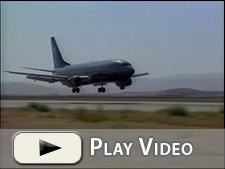
Video segments showing all aspects of the GPS-related technologies used in automated airplane navigation, takeoffs and landings in 1994. This video features the team of graduate students from the Stanford University GPS Lab who pioneered and developed these technologies.
Video courtesy of Stanford University Archives
Run Time: 13 Minutes, 5 Seconds
View 1994 Stanford Integrity Beacon Landing System B-Roll Video
1994 • Stanford News Service: The Integrity Beacon Landing System
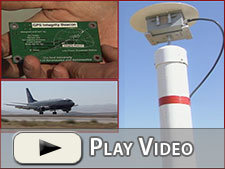
An 11-minute narrated video chronicling the evolution of Stanford's Integrity Beacon automated airplane landing system from GPS-based spacecraft attitude and control guidance technology developed for the Stanford/NASA landmark Gravity Probe B mission testing Albert Einstein's general theory of relativity and its extension and augmentation by a team of Stanford graduate students into a combination satellite and ground-based pseudo-satellite (integrity beacon) system that could land a Boeing 737 aircraft autonomously in inclement (restricted visibility) weather.
Video courtesy of the Stanford University Archives
Run Time: 11 Minutes
View 1994 Stanford News Service Video: The Integrity Beacon Landing System
